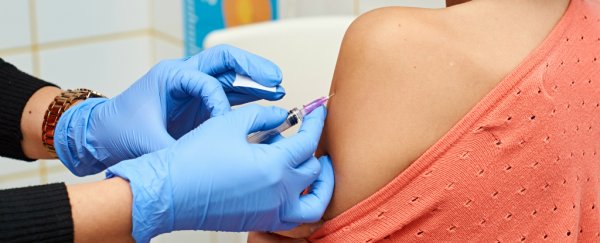Two decades after the study that falsely linked autism and vaccinations was formally retracted, the legacy of the anti-vax movement just keeps getting worse.
Now, a new study has found parents of children with autism spectrum disorder ( ASD) are especially hesitant to vaccinate their children, and misinformation is most likely to blame.
The new research has revealed that children with ASD and their younger siblings are far less likely to get all of their shots, putting these children at needless risk of contracting perfectly preventable diseases.
When the researchers sifted through the health data of nearly 600,000 children between the ages of 8 and 23, they found that only 81.6 percent of those with ASD received all the recommended vaccinations for children aged 4 to 6.
In comparison, the vaccination rate among children without ASD sits around 94.1 percent – a whole 12.5 percent higher.
"These findings suggest that children with autism and their younger siblings may be at greater risk of vaccine-preventable diseases," lead author Ousseny Zerbo told MD Magazine.
"Vaccine hesitancy or refusal may play a role in children not getting properly vaccinated."
All in all, the study found children with ASD are less likely than children without ASD to be vaccinated for diptheria, tetanus and pertussis (89.1 percent vs. 96.6. percent), polio (87.5 percent vs. 95.9 percent), and measles, mumps and rubella (84 percent vs 95.9 percent).
Even though multiple, extensive studies have found no relationship between vaccinations and ASD, many parents remain worried by the unsubstantiated rumors regarding the safety of vaccinations.
"Parents of ASD kids may be worried; they may still feel that the MMR vaccine led to autism. And that a second dose may cause a regression," said Sydney University's Dr Nicholas Wood, who was not involved in the study.
The fear is so great, it looks as though parents of children with ASD are also under-vaccinating their other children.
The study found that the vaccination rates for the younger siblings of children with ASD were also scarily low. Compared to their peers, younger siblings of children with ASD are getting vaccinated 6.8 percent less on average.
Considering the low rate of vaccinations among younger siblings and the fact that vaccination rates among children with ASD seemed to improve with age, the researchers hypothesize that "some parents consider the potential risks of ASD associated with vaccination to be greatest at these younger ages at which more vaccinations are recommended."
While the researchers couldn't say for sure whether vaccine reluctance was the only factor that contributed to these low vaccination rates, the researchers believe it plays a crucial role.
The hypothesis is buttressed by previous research that has found "a large proportion of parents of children with ASD consider that vaccines contributed to their child's ASD."
"Now more than ever before, vaccine reluctance has become a standard topic for podium presentations," said Michael Grosso, the medical director and chairman of the department of pediatrics at Huntington Hospital.
"It's become a subject of scholarly research, not only to understand the epidemiology of vaccine reluctance but also more recently to identify tested strategies for countering that with education and relationship-based interventions."
Unless a new strategy to address vaccine hesitancy is researched and developed, children with ASD and their siblings will continue to be put at undue risk.
The study was published in JAMA Pediatrics.
This article was originally published by Science As Fact.
Science As Fact is our sister site where we cover politics, debunking, fact checking, and humour. If you want more like this, head over to Science As Fact.
